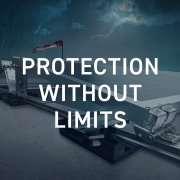Spring is upon us, heralding the begin of the construction season. However, the winter cannot be forgotten when choosing solar modules. Roof-integrated systems, in particular, need to withstand snow, moisture, and wind, as these systems become a part of the building envelope. SOLON SOLitaire is well-suited for these types of applications. Last winter deposited much snow in Germany, and this roof-integrated system was among the most stable systems currently available on the market.
SOLON has demonstrated in extensive testing that the SOLON SOLitaire is capable of withstanding continuous snow loads of up to 700 kg/m2. For this reason, it is best suited for regions in the snow load zone III. This includes, for example, the German Alps up to 1,000 meters above sea level.
Furthermore, SOLON SOLitaire performs well even when subjected to heavy hail or major storm systems. SOLON recently tested this aspect and can certify it, in accordance with the internationally recognized IEC 61215 and DIN EN 1991 testing standards. This extraordinary stability is the result of high quality of manufacturing, an innovative polyurethane frame, and the 18 connection points used to directly install the system on the roof structure.
Each module of the SOLON SOLitaire has a maximum capacity of up to 250 Wp over a limited surface area: 12 modules can now produce 3 kWp on just 25 m2, which is enough electricity to provide a family of four with energy for one whole year.
The fully-integrated system is suitable for all types of roof coverings and does not require a special substructure. It can be quickly and easily installed. It weighs only 14 kg/m2. Ventilation holes ensure optimum air circulation behind the modules to prevent losses of efficiency due to undue heating. In addition, the SOLON SOLitaire is the first and only roof-integrated system that passed the fire safety test of the Centre Scientifique et Technique du Bâtiment (CSTB), a French-based testing institute for building services technology.















